You can have the slickest ads, the flashiest social channels, and the best product to ever exist, but if no one can find you, does it even matter? Welcome to the joys of SEO.
Search engine optimization is more than just sprinkling a few keywords here and there in the hopes that Google notices. It’s the backbone of online visibility, the trust signal that tells customers you’re legit, and the compounding growth engine that keeps paying off long after your ads stop running.
In 2025, SEO’s role is bigger than ever. With AI tools reshaping how people search, the question isn’t just “Why is SEO important?” It’s “Can your business survive without it?”
Need Help Building a Foundational SEO Strategy?
What Is SEO & Why Is It Important?
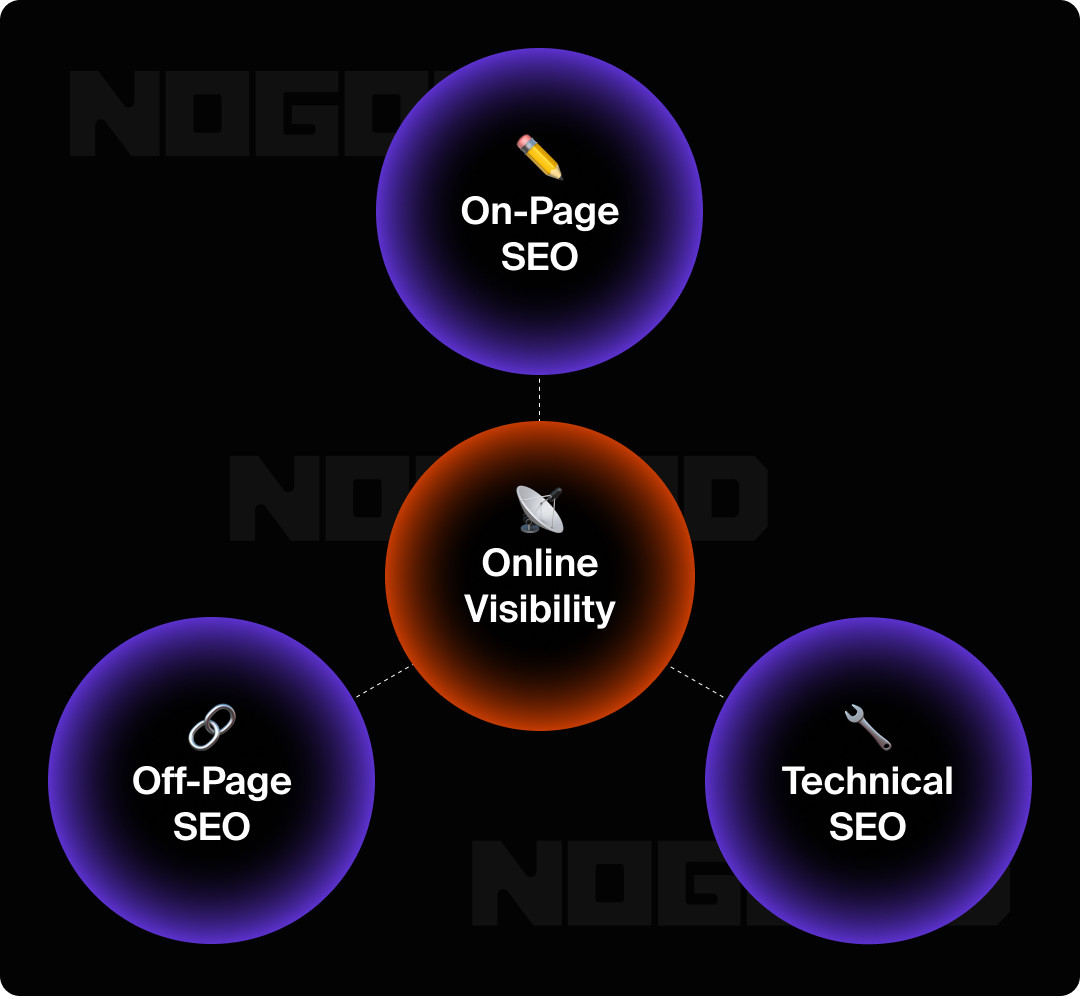
Search engine optimization (SEO) is just about making sure people can find you online. That’s it. You could have the best product in the world, the funniest TikToks, or the most genius ad copy ever, but if your site doesn’t show up when someone Googles (or asks ChatGPT) for what you offer, you’re essentially playing hide and seek with your customers.
SEO has three main sides to it:
- On-page SEO → the words, structure, and content on your site that match what people are searching for.
- Technical SEO → the behind-the-scenes stuff like site speed, mobile-friendliness, and making sure search engines don’t have a panic attack trying to crawl your site.
- Off-page SEO → what other people say about you online: backlinks, reviews, mentions. Think of it as your site’s reputation score.
Why does it matter, you ask? Because almost 7 out of 10 online experiences start with a search. If you’re not showing up there, honey, you’re invisible. Unlike paid ads, which vanish the second you stop spending, SEO is more like compound interest: the work you put in today keeps paying off tomorrow.
And search doesn’t just mean Google anymore. AI tools like ChatGPT, Gemini, Perplexity, and millions of others are pulling from the web to serve up customers with direct answers. If your content is optimized and credible, you don’t just show up, you have the opportunity to become the answer. That’s the new version of “ranking #1.”
So why does it matter to businesses? Let’s explore.
Why Is SEO Important for Businesses?
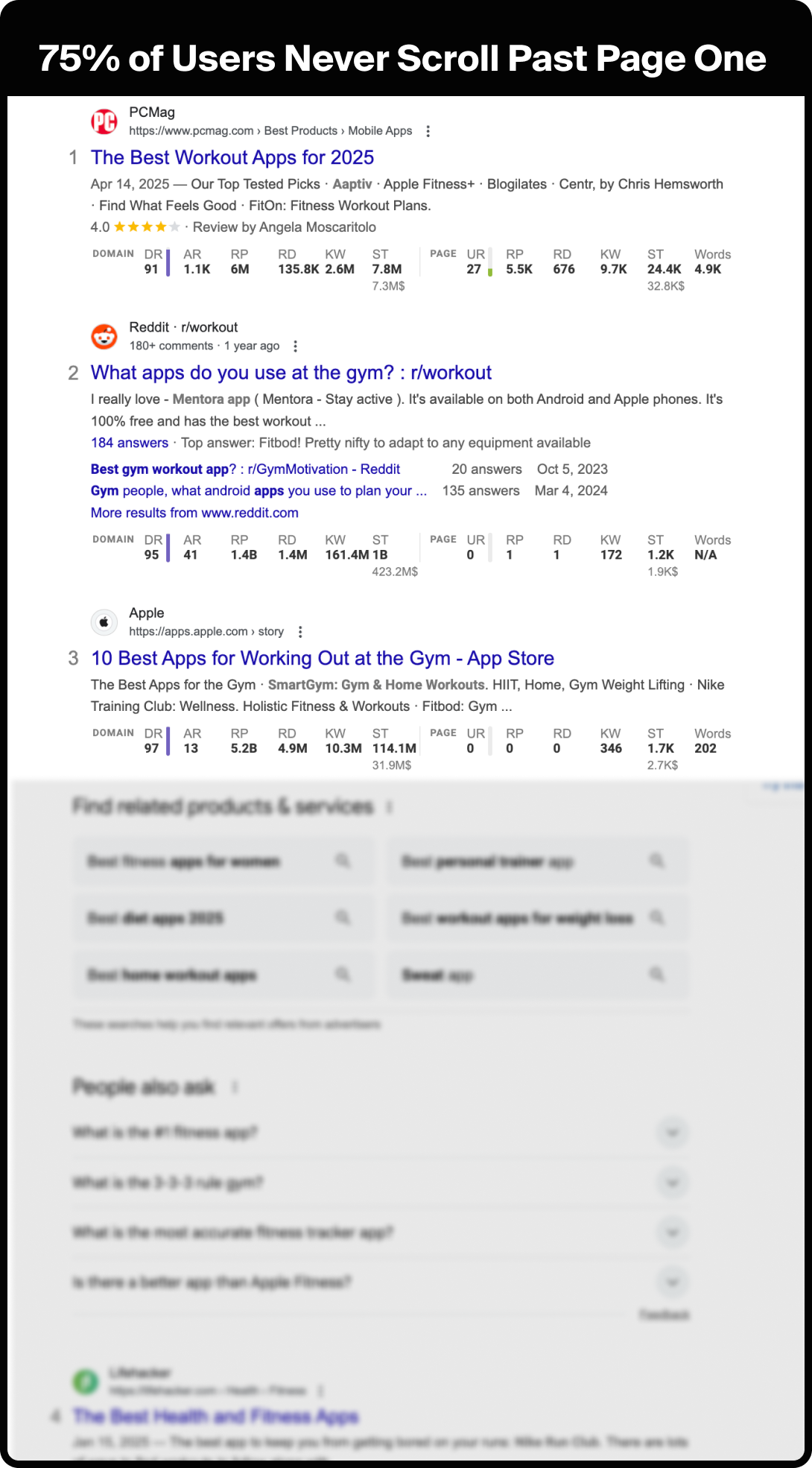
I’m going to give it to you and your CEO straight: if your business isn’t visible online, it might as well not exist. In fact, 75% of users never scroll past the first page of search results, so your customers aren’t going to hunt you down. You need to appear right in front of them.
SEO is what makes sure your brand shows up where your customers are already looking. And that visibility snowballs into four big business wins:
- Visibility & Awareness: SEO gets your name out there, literally. Ranking high in search results (or showing up in AI answers) means more eyeballs on your business without paying for every single click.
- Trust & Credibility: People trust Google’s first page. They also trust brands that show up as citations in AI answers. When you rank well, you’re not just discoverable; you look legit.
- Cost-Effective Growth: Unlike paid ads, which stop the second your budget does, SEO keeps working in the background. Think of it as the difference between renting visibility (ads) and owning it (organic search).
- Long-Term Value: The work compounds. The blog you publish today could keep bringing in traffic, leads, and authority for months or even years. Paid campaigns? Not so much.
And, the kicker is: SEO is only growing more as AI takes center stage in search. Whether it’s ChatGPT, Google Gemini, or Perplexity, these tools need reliable sources to pull from. If your site is optimized, authoritative, and consistent, you’re more likely to be the business that gets surfaced as the answer.
So, we’ve covered why SEO is a big deal for businesses in general: visibility, trust, cost savings, the whole package. But let’s get a little more practical: what actually makes SEO work?
It actually starts on your own turf, with what’s called on-page SEO. This is everything you directly control on your site: your content, keywords, structure, and even how fast the darn thing loads. Nail this, and you’ve built a foundation search engines (and AI tools) can’t ignore.
On-Page SEO: Why It Matters
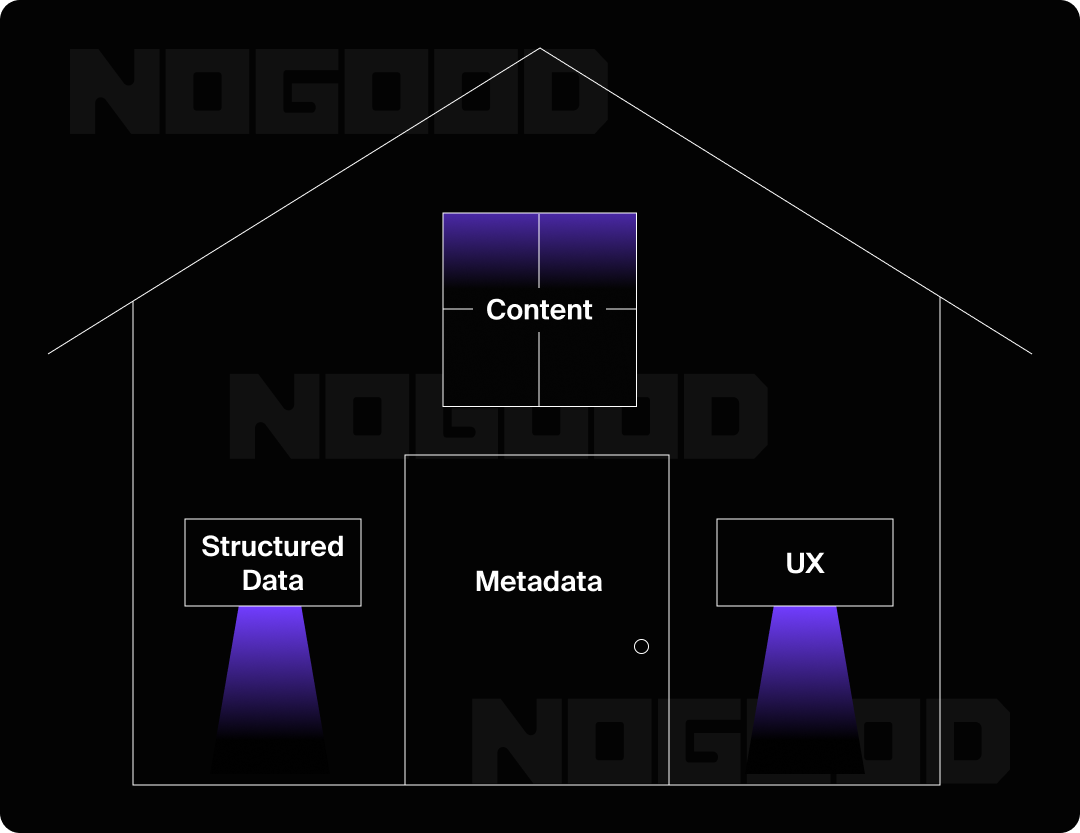
If SEO is the engine that drives online growth, on-page SEO is the fuel. It’s everything happening on your actual website that signals to search engines (and now AI crawlers) that you’re worth showing to users.
Here’s what that includes:
- Keywords & Content: This is the obvious one. Using the words your audience is actually searching for. But it’s not about stuffing “best shoes New York buy now” into every paragraph. It’s about understanding search intent (what people mean when they type something in) and creating content that genuinely answers it.
- Site Structure & Metadata: Think titles, headers, URLs, and meta descriptions. They may look small, but they’re like little neon signs telling Google and AI tools, “here’s what this page is all about”. Ignore them, and you’re basically hiding your site in plain sight.
- User Experience: Google doesn’t just read your site; it watches how people use it. A slow site, clunky navigation, or “mobile-unfriendly” design can tank your rankings. (Pro tip: nearly 60% of all Google searches happen on mobile devices, so if your site looks like 2010 on a phone, you’ve got a problem.)
- Structured Data: This one’s underrated. Adding schema markup (a fancy word for machine-readable labels) helps search engines and AI tools understand your content. That’s how you earn things like featured snippets, FAQs, and citations in AI Overviews—the SEO jackpots of 2025.
Getting your on-page SEO right is like making sure your house is in order; the lights are on, the doors aren’t squeaky, and visitors can actually find the bathroom. But here’s the thing: Google (and AI tools) don’t just care about what you say about yourself. They care about what everyone else says about you, too.
That’s where off-page SEO comes in.
Off-Page SEO: What It Is & Why It’s Important
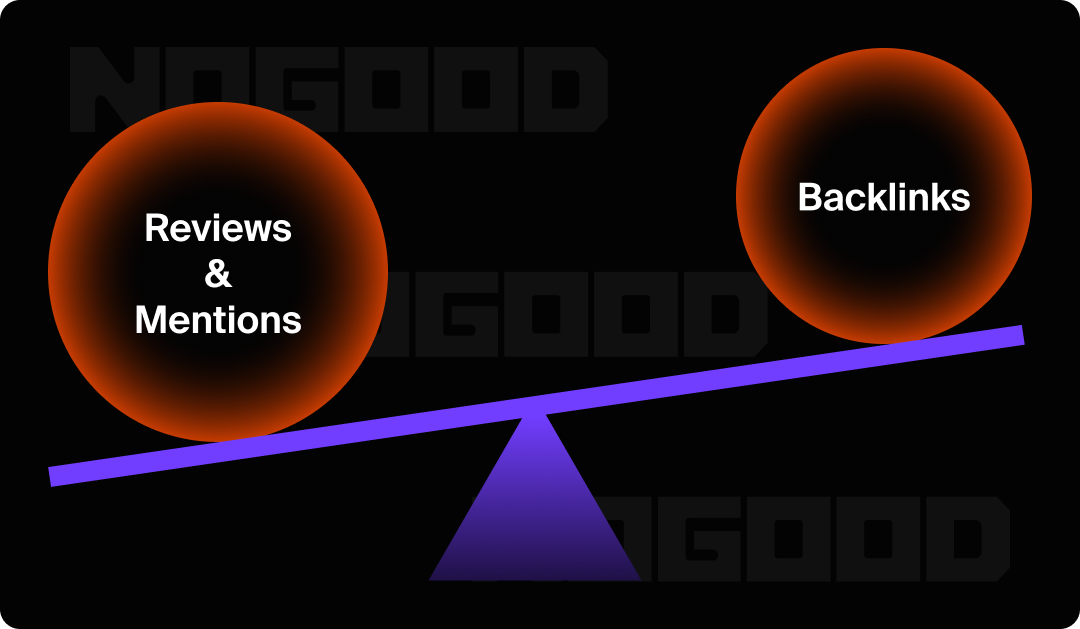
If on-page SEO is about how you present yourself, off-page SEO is basically your reputation. It’s the digital word-of-mouth that tells Google, AI tools, and potential customers, “Yep, this brand is legit.”
Here’s what makes it tick:
- Backlinks (The Classic Power Move): When another credible site links to yours, it’s like a vote of confidence. Not all votes are equal, though; a backlink from The New York Times is worth a lot more than one from your cousin’s blog.
- Local SEO: For businesses with physical locations, your Google Business Profile, Google Maps presence, and local reviews are gold. In fact, 76% of people who search for something nearby visit a business within a day. If your local SEO game is weak, you’re literally leaving customers on the table.
- Reputation & Reviews: What customers say about you online matters more than ever, because it doesn’t just sway buyers, it feeds into how AI tools decide whether to trust you. Lots of positive reviews = stronger signals that you’re a reliable source.
- Mentions & Social Proof: Even if it’s not a direct link, mentions of your brand across press, social media, and directories still boost credibility. It’s like your brand’s digital footprint: bigger footprint, bigger authority.
Why does this matter? Because Google and AI models both want to surface trustworthy, authoritative answers. And authority isn’t just built on what’s on your site; it’s built on the ecosystem around you. The more your brand gets talked about (in the right places), the stronger your SEO foundation becomes.
The Role of SEO in Growth Marketing
You can run all the ads you want, post daily on LinkedIn, and blast out emails like it’s your job, (and maybe it is). But without SEO, your growth marketing strategy has a giant hole in it.
SEO is the connective tissue that makes every other channel stronger:
- Fuel for Paid Media: The keyword data you uncover from SEO research doesn’t just help you rank; it helps you run smarter ads. You already know what your audience is searching for, so why not use that intel to guide your targeting?
- Content That Actually Compounds: Blog posts, landing pages, and guides optimized for SEO don’t just work once. They keep pulling traffic long after you hit publish. That compounding effect is the definition of growth marketing: efforts that scale over time instead of fizzling out.
- Lower Customer Acquisition Costs (CAC): Ads and paid campaigns are like renting growth, stop paying and it all disappears. With SEO, you own growth. Done right, it steadily lowers your CAC by bringing in organic traffic you don’t have to keep buying.
- Trust + Brand Authority: In growth marketing, trust is currency. When you’re consistently visible in organic search and (increasingly) in AI answers, your brand builds authority that money alone can’t buy.
SEO is the engine that keeps your growth loop spinning. Paid, social, email, CRO; they all benefit from it. Without SEO, you’re just patching together short-term wins without building long-term momentum.
And while SEO has always been the backbone of growth marketing, the game is changing fast. All of these AI articles I’ve been writing aren’t for nothing. We’re not just optimizing for blue links anymore. We’re optimizing for LLMs (large language models) and AI search engines that are rewriting how people discover brands in the first place.
Future of SEO: AI Search & Beyond
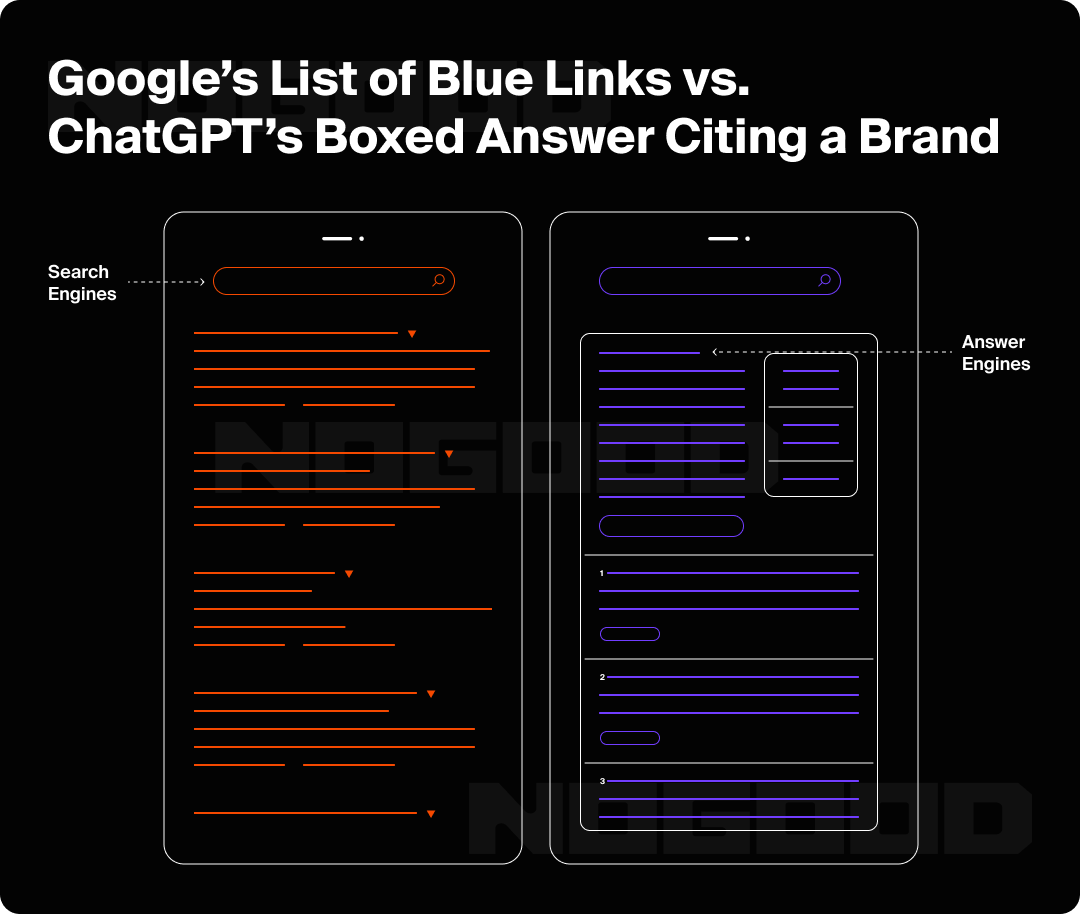
For years, SEO’s entire MO was all about one thing: ranking higher on Google’s SERP (search engine results page). But as we look ahead, it’s becoming a whole different ball game.
We’re in the era of AI search (think ChatGPT, Google’s Gemini, Perplexity), and we’re watching these companies duke it out to see who will reign supreme and capture most of the market (just like Google in the early 2000s).
These platforms aren’t just listing links; they’re generating direct answers. And the sources they pull from? Well, that’s where SEO comes in (and GEO/AEO/AI SEO/LLMO; whatever you want to call it).
Here’s what’s shifting:
- Zero-Click Results Are the Norm: Between featured snippets, AI Overviews, and direct answers in ChatGPT, users are getting what they need without ever clicking through. That means SEO isn’t just about driving traffic anymore, it’s about making sure your brand shows up in the answer itself.
- (H)E-E-A-T Signals Matter More Than Ever: I’m really trying to make that “H” happen. Helpfulness, Experience, Expertise, Authoritativeness, and Trustworthiness (H-E-E-A-T) aren’t just Google jargon; they’re how AI models decide if you’re a reliable source. Brands with consistent, credible content are far more likely to be surfaced.
- Structured Data = Machine Readability: Schema markup and well-structured content help both search engines and LLMs understand your site. If you want to be featured in AI answers or rich snippets, you need to speak their language.
- Brand Authority Will Make or Break You: AI tools are trained on patterns across the web. If your brand is consistently mentioned, linked to, and reviewed positively, you’re more likely to be the one they cite. Authority compounds, and in the AI era, that authority is visibility.
The takeaway: SEO isn’t going away; it’s evolving. To win, you can’t just optimize for search engines; you need to optimize for answer engines. If you want to learn even more about AI, like the rest of the world seems to be doing, check out some of our other amazing content around AI and AEO.
Of course, with all of this change comes a lot of confusion. And SEO has picked up more than its fair share of myths over the years (if you’ve ever heard someone say “SEO is dead” or “AI is replacing SEO,” you know exactly what I mean).
Which brings us to…
Common Misconceptions About SEO
For something that’s been around for decades, SEO is still wildly misunderstood (if it’s even understood at all). Let’s clear up a few of the biggest myths that grind my gears and could hold businesses back:
“SEO is just about keywords.”
Nope. Keywords matter, but SEO is just as much about technical health, user experience, and authority; and now, whether AI models actually trust you as a source, too. Think of keywords as the invitation, not the whole party.
“SEO is a one-and-done project.”
Sorry, but you don’t “finish” SEO. Search algorithms change, competitors adapt, and your own business evolves. SEO is ongoing maintenance and momentum, it’s more like going to the gym than checking off a to-do list.
“SEO doesn’t matter anymore because AI will just answer everything.”
This one’s new, but also wrong. AI answers don’t come out of thin air, they’re trained and generated from existing content. If your site isn’t optimized and credible, you’re not even in the running to be cited in those answers.
“You can just buy ads instead of doing SEO.”
Sure, but that’s like renting a house instead of owning one. Ads stop working the second you stop paying. SEO builds long-term equity that compounds over time.
Pro Tips: How to Get SEO Right
Okay, so we’ve cleared up the myths. Now let’s talk about what actually works. SEO can feel like a giant, ever-changing puzzle, but there are a few best practices that hold up no matter what Google (or AI) throws our way:
- Use Schema Markup: Think of it as adding labels to your content so machines know exactly what they’re looking at. It’s your ticket to rich snippets, FAQs, and maybe even a spot in AI answers.
- Keep an Eye on Core Web Vitals: Google tracks how fast your site loads, how stable it is, and how smooth the experience feels. If your site is clunky, your rankings will pay the price.
- Build Topical Authority: Instead of scattering random blog posts everywhere, go deep on topics your audience cares about. Become the go-to source in your niche, and both humans and AI will treat you like an authority.
- Leverage SEO Insights Across Channels: Don’t silo SEO. Use keyword and content insights to guide paid campaigns, inform social strategy, and even inspire email marketing. It all feeds the same growth engine.
- Optimize for Humans First, Machines Second: Algorithms may decide your rank, but people decide your value. Write content that’s easy to read, genuinely helpful, and doesn’t sound like a robot wrote it.
This isn’t about gaming the system. You’re building content and experiences that deserve to rank. Search engines and AI are just the middlemen connecting you to your audience.
SEO: The Growth Engine You Can’t Afford to Ignore
SEO isn’t just another marketing tactic. It’s the foundation that holds the whole growth strategy together. It’s how your brand gets discovered, how it builds trust, and how it stays relevant in a world where AI and search are blending into one.
Skip SEO and you might as well hand your visibility (and customers) to your competitors. Invest in it, and you’re building an engine that keeps compounding, fueling every other channel you run.
So the question isn’t “Why is SEO important?” anymore. It’s “How soon can you get serious about it?”






